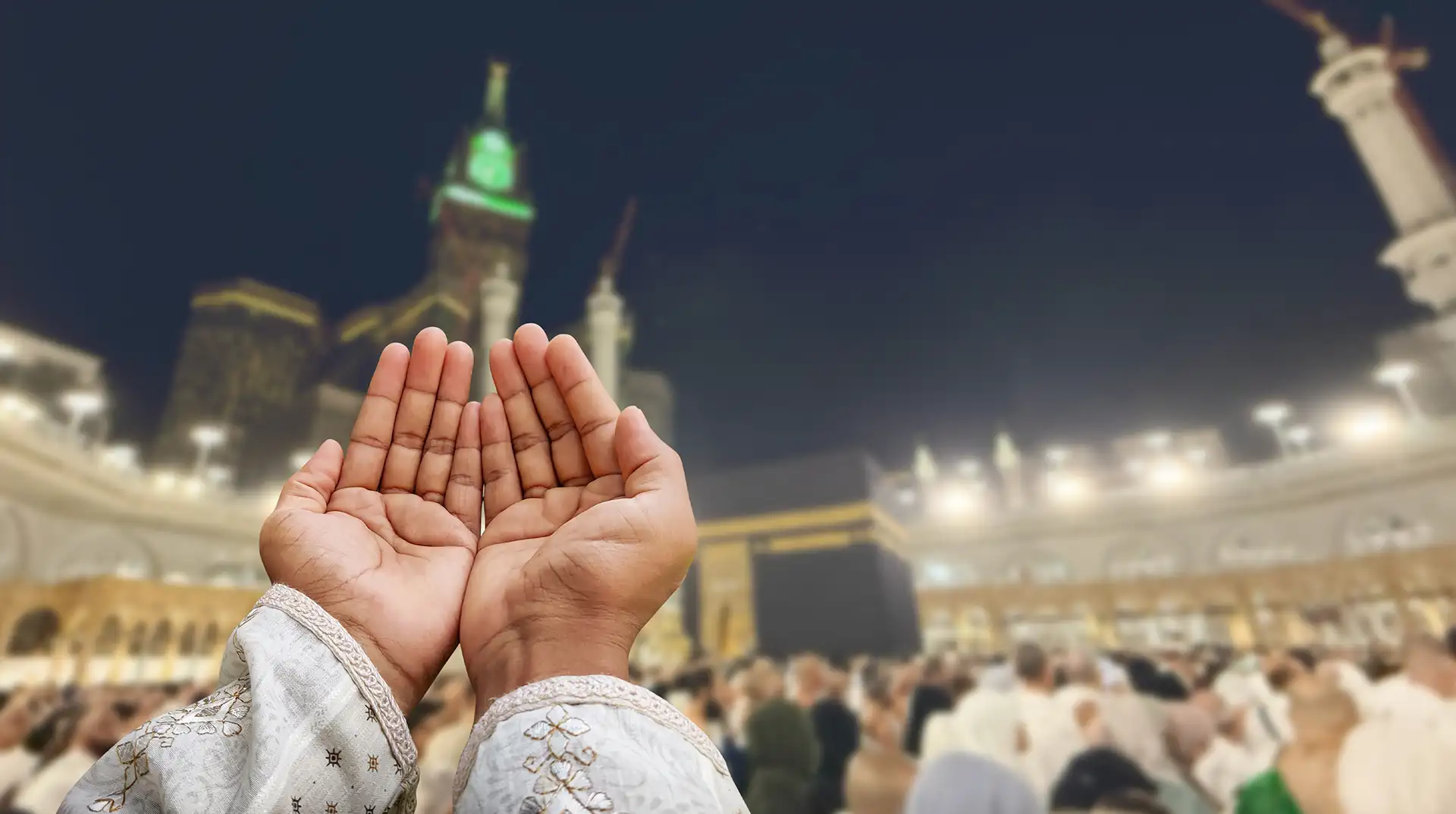The Umrah pilgrimage is a visit to the holy city of Mecca that Muslims do as a way to worship and connect with Allah. It is not required like Hajj, but it is still an important act of worship.
So, what is Umrah exactly? It is a non-mandatory pilgrimage that Muslims can do at any time of the year, outside the Hajj season. It holds deep spiritual meaning and gives Muslims a chance to renew their faith and seek forgiveness.
Umrah is seen as a way to express devotion and feel closer to Allah. Many people perform Umrah to find peace, ask for spiritual cleansing, and build a stronger connection with their beliefs.
During the Hajj season, which occurs in the month of Dhu al-Hijjah, only Hajj is permitted; Umrah may be performed at any other time of the year.
The Importance of Umrah in Islam
Umrah is a special journey with many spiritual benefits for Muslims. Here’s why it matters:
- Forgiveness of sins – A sincere Umrah is believed to wipe away past sins and offer a clean start.
- Guest of Allah – Pilgrims are seen as guests of Allah and receive blessings during their visit.
- Strengthening faith – The experience helps deepen a person’s connection with Allah and their belief in Islam.
- Spiritual renewal – It gives time to step back from daily life and focus on prayer and worship.
- Unity among Muslims—People from all over the world gather at Masjid al-Haram in Mecca to show equality and brotherhood.
- Time for reflection – The setting encourages self-checking and new life goals.
- Physical and mental boost – Walking and praying help keep both body and mind active and clear.
- Chance to learn – Visiting historic Islamic places helps pilgrims understand more about the Prophet Muhammad (PBUH) and early Islam.
- Powerful prayers – Duas made at Masjid al-Haram in Mecca are believed to carry more weight.
- Getting ready for Hajj – Umrah helps prepare people for Hajj by giving them a feel for the rituals and environment.
- Following the Sunnah – Prophet Muhammad (PBUH) performed Umrah four times. His actions highlight how important this act of worship is in Islam.
- Spiritual value in Ramadan – Doing Umrah in Ramadan is seen as extra meaningful and brings a greater reward.
Who Can Perform Umrah?
Before traveling to Saudi Arabia for Umrah, you need to know some basic rules. Not everyone is eligible, and certain conditions apply based on age, health, and other factors.
Saudi Tourist eVisa
- Who Can Apply: Citizens of 66 eligible countries, as well as individuals who are residents of a GCC country or who hold a valid residency permit, tourist visa, or business visa from the UK, the US, or a Schengen country, are eligible to apply. However, this does not apply to citizens of Chad, Ethiopia, Iran, Libya, Palestine, and Syria.
- Application Process: Apply online through the Saudi eVisa portal.
- Validity: It’s a multiple-entry visa that lasts for one year. You can stay up to 90 days in total.
- Flexibility: Muslim travelers can visit Makkah and Madinah, and all around Saudi Arabia. All travelers can move around the rest of Saudi Arabia freely.
Umrah Visa
- Who Should Apply: Travelers from countries that are not eligible for the Saudi Arabia eVisa.
- Application Process: You must apply through authorized travel agencies in your country of residence or choose from the agencies featured on the Nusuk platform.
- Validity: Usually valid for 90 days from the date it is issued.
- Type: It is a single-entry permit, meaning you can enter the country once and must leave before it expires.
- Umrah Visa Rules: This visa cannot be used during the Hajj season.
Important Entry Notes
- Only Muslims are allowed to enter Makkah and Madinah. Non-Muslims are strictly not allowed in these holy cities.
- Overstaying either visa can lead to fines, detention, or a ban from returning.
- Pilgrims holding Umrah visas are permitted to enter the Kingdom of Saudi Arabia via international airports in Jeddah, Madinah, Yanbu, and Taif.
- Make sure to install the official Nusuk app, as you’ll need it to apply for your Umrah permit after obtaining your visa.
Specific Conditions
- Women (Ages 18–65) – Women in this group can go without a male guardian now. They used to need to join a group and have a no-objection letter from their mahram before.
- Minors (Under 18) – Children must travel with a parent or guardian.
- Elderly and Disabled – Older adults should check if they can complete the rituals. Wheelchairs are available at airports and Masjid al-Haram. It’s best for them to have someone with them to help during the trip.
General Eligibility
- Muslim Faith – Only Muslims are allowed to perform the Umrah pilgrimage.
- Minimum Age – Anyone 18 or older can apply independently. Those under 18 must travel with a parent or legal guardian.
- Health Requirements – Pilgrims should be physically and mentally fit. Vaccinations and general health checks are required.
- Valid Documentation – A valid passport with at least six months’ validity and a confirmed return ticket are required.
Vaccinations and Health
- Starting February 1, 2025, all pilgrims aged 2 and above must show proof of the meningitis (ACYW135) vaccine.
- Travelers from certain countries must show a polio certificate and may get another dose upon arrival.
- Some regions may require preventive treatment at entry.
- Pack all personal prescriptions and extra supplies.
- Bring basics like band-aids, wipes, and pain relievers.
Travel Documents
- Make sure your passport is valid for at least 6 months after your travel dates.
- Apply early for an eVisa, if eligible, or through authorized agents, if not eligible for the eVisa.
- Keep both paper and digital copies handy.
- Carry proof of where you’re staying.
- Bring the required vaccination certificates.
- Keep a list of embassy numbers and family contacts.
Spiritual Preparation
- Understand the steps of Umrah, including Ihram, Tawaf, Sa’i, and Halq/Taqsir.
- Make a sincere niyyah to perform Umrah for Allah alone.
- Carry a list of personal prayers to read along the way.
- Repent from past sins and try to go with a clean heart.
How to Perform Umrah
The Umrah includes a few main steps. Each one has a purpose and helps Muslims show devotion while visiting Masjid al-Haram in Mecca. If you’re wondering how to do Umrah, here’s a clear step-by-step guide:
- Entering Ihram
Ihram marks the official start of the Umrah journey. Before crossing the Meeqat (entry point to Mecca), pilgrims take a full bath, wear special clothing, and make their intention to perform Umrah.
Men wear two white clothes, while women wear modest clothing that covers their bodies. At this point, perfume and cutting nails or hair are not allowed. The pilgrim then says the words of intention and begins to recite the Talbiyah (a prayer said during Ihram). - Tawaf (Circling the Kaaba)
Once inside Masjid al-Haram, the pilgrim walks around the Kaaba seven times in a counterclockwise direction. This act is called Tawaf. It starts and ends at the Black Stone.
Men keep their right shoulder uncovered during Tawaf. After finishing the seven rounds, two rakats of prayer are performed behind or near the Station of Ibrahim (Maqam Ibrahim). - Sa’i (Walking Between Safa and Marwah)
Next in the Umrah process is Sa’i. Pilgrims walk back and forth between the hills of Safa and Marwah seven times. Men run between the two green markers during part of this walk.
Pilgrims stop at each hill to face the Kaaba, pray, and reflect. - Cutting or Shaving Hair
To complete Umrah, men either shave their heads or trim their hair evenly. Women cut a small portion of their hair, about the length of a fingertip. Once this is done, the pilgrim is no longer in the state of Ihram.
This completes the Umrah process. Ihram ends after the haircut, and the pilgrim can return to normal life. Each part of the Umrah pilgrimage is a form of worship that helps Muslims grow closer to Allah.
Knowing what is Umrah and how to perform Umrah step by step makes the journey easier and more meaningful.
When Can You Perform Umrah?
Umrah can be performed at any time of the year except the Hajj season, but a few things can affect your plans, especially the season and visa rules.
Seasons for Umrah
Ramadan is a popular time for Umrah because of its religious value. However, the crowds are big, and prices for hotels and flights usually go up.
Winter months (October to March) are more comfortable. The weather is mild, and travel costs may be lower. It’s a good time to go if you want less heat and a balanced crowd.
Summer months (May to September) bring very high temperatures, often over 45°C. Fewer people go during this time. The heat can be tough, especially during daytime rituals.
How Long Does Umrah Take?
The core rituals, Ihram, Tawaf, Sa’i, and haircut, can be done in 3 to 6 hours. But most people plan to stay for 5 to 10 days to allow time for travel, rest, and extra prayers.
Some even stay up to 14 days to visit other sites or avoid rushing.
Visa Requirements and Planning
You’ll need a transit visa, a tourist visa, or an Umrah visa to perform Umrah. It’s best to apply early, especially during busy seasons, as spots can fill quickly.
When booking your trip, make sure to plan ahead. Reserve flights and hotels a few months before your travel date to avoid high costs and limited options. This is especially important during Ramadan.
How to Prepare for Umrah
Getting ready for Umrah takes more than just booking a flight. Here’s a list of simple tips to help you plan your spiritual and practical journey.
What to Pack
Clothing
- Men: Two sets of Ihram, loose-fitting clothes, sandals, and a waist pouch.
- Women: Loose abayas, hijabs, comfortable shoes, and a neck pouch.
Toiletries
- Unscented items only, such as soap, shampoo, toothpaste, deodorant, and hand sanitizer.
Prayer Essentials
- Pocket Quran, prayer mat, tasbeeh, and a small dua book.
Electronics
- Phone with charger, power bank, universal adapter, and a Saudi SIM card or an eSIM.
Miscellaneous
- Water bottle, snacks, sunglasses, an umbrella, and a small backpack.
By following these simple tips and keeping Umrah visa rules in mind, you can focus more on your worship and less on last-minute issues.
Umrah Visa & Entry Requirements
Before traveling to Saudi Arabia for Umrah, it’s important to know which visa you need and how the rules work. Your visa type depends on your nationality and travel plans.
Umrah vs Hajj – What’s the Difference?
Hajj and Umrah are two distinct Islamic pilgrimages to Makkah, each with its own significance, rituals, and requirements. Here’s a brief comparison:




























































































































































































































